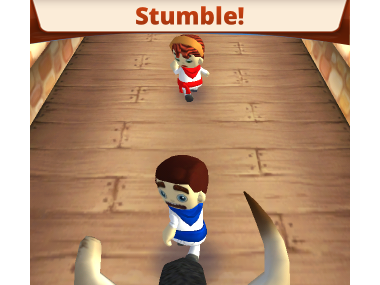Schadenfreude With Friends: Zynga’s Rivals Explain Why They’re Not Also in Trouble

It hasn’t been a great week for Zynga. The company has been in the spotlight for all the wrong reasons, with 18 percent of its workforce laid off, three offices shut down, lowered guidance for the second quarter and a precipitous stock drop.
Certainly, many of Zynga’s ills come from the fact that it is a big company in a volatile industry that is reorienting around mobile games.
But it’s hardly the only one, which is why I asked executives at some of Zynga’s top competitors to compare themselves to the company, and to explain what, if anything, they think they’re doing better that will help them avoid similar troubles.
Perhaps the most thoughtful response came from Kixeye CMO Brandon Barber, who correctly pointed out that his response (and others’) could only say so much, because audiences and distribution strategies can vary wildly, despite similar end products. Barber credited the fact that his company “zigged when everyone was zagging” a few years ago. The zaggers, he said, followed Zynga’s strategy of making games for a low-monetizing mass audience, as opposed to Kixeye’s niche of combat/strategy gamers, who spend a lot more on in-game purchases.
One of the companies that — to borrow Barber’s word — zigged is CrowdStar, which was founded in 2009 and also focused on the Web and social games at first. Chairman Peter Relan said the company has spent the past two years refocusing around mobile, although data from App Annie suggest that its biggest mobile successes were back in early 2012.
Indeed, a troubling facet of Zynga’s planned/ongoing mobile transition is that it’s already doing far better than most in the arena. As recently as three weeks ago, again according to App Annie, the Zynga game Running With Friends held the overall No. 1 spot in the Apple iOS top-downloaded charts. Kixeye’s Barber speculated that Zynga is facing the “classic scaling problem” of having a mobile growth strategy, but not a sufficiently built-out infrastructure to support and sustain that growth.
DeNA West CEO Clive Downie cited his company’s mobile-first stance as the key to its successes, particularly on Android. Since last year, Downie has also been the CEO of Ngmoco, which DeNA — a Japanese company that thrived by making games playable on feature phones — acquired for its expertise in the American smartphone market back in 2010.
Curiously, Zynga’s nearest competitor in the social-mobile space — King — declined to answer the question. PR representative Paul Brady said, “It’s a policy at King not to comment on other company’s downfalls” (ouch! Update: Brady later clarified that this is not an official company line, but rather his own “poor choice of words”). Never mind the fact that King PR has sent no fewer than three email pitches in the past two months contrasting the success of their games against Zynga’s declining numbers.
Mobile game studio Gameloft also declined to comment.









